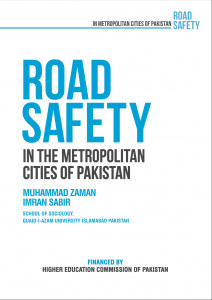Road Safety in Pakistan: Leveraging Smart Technologies and Policy Interventions for Safer Roads
Conference Overview
Conference Date: September 18, 2025, from 9 am to 5 pm
Venue : Quaid-i-Azam University Islamabad
The Road Safety in Pakistan Conference aims to bring together researchers, practitioners, policymakers, and industry experts to explore the current state of road safety in Pakistan and to discuss innovative approaches for improving it. The conference will focus on the integration of smart technologies, data-driven strategies, and effective policy interventions to address the challenges of road safety in Pakistan. Participants will have the opportunity to present their research, share insights, and collaborate on developing actionable solutions to enhance road safety.
We invite researchers, practitioners, and policymakers to submit papers that contribute to the understanding and improvement of road safety in Pakistan. Submissions should align with the themes outlined below and present original research, case studies, policy analyses, or reviews of best practices.
Key Themes:
AI-Powered Traffic Management and Infrastructure Optimization
Accident Data Analytics and Analysis
Technology Integration in Traffic Laws Enforcement
Automated Penalty Systems through Smart Licensing
Public-Private Partnerships for Smart Transport Systems
Sustainability of Urban Transport System
Pedestrian and Cyclist-Friendly Urban Design
Urban Sprawl and its Effect on Road Safety and Traffic Flow
Policy Interventions for Car-Free Zones and Reducing On-Street Parking Demand
Policies for Promoting Public Transport
Road Safety Sensitisation and Social Marketing for Road Safety
Transport Policies for Carbon Emission Reduction
Post-Crash Care and Emergency Response Systems
Gaps between Road Safety Curriculum and Public Practices
Designing of Prototype Model of Smart Public Transport
Centralized Command and Control Center
Measuring on Road Air Pollution to Reduce Vehicles’ Carbon Emissions
Social Research, Advocacy and Lobbying for Effective Legislation
Transportation and Society
Submission Guide
Abstract Submission
The abstract should provide a concise and concrete summary of the research conducted, the conclusion reached and the potential implications of the conclusions. The abstract should have the following:
- The abstract may consist of a single paragraph with maximum 150 words with correct grammar and appropriate terminology.
- It is recommended not to use abbreviations, footnotes, references or mathematical equations.
- Feature the novelty in your work.
- It may constitute 3-5 keywords or phrases that describe the research, with clearly defined abbreviations that may help the readers to find the basic theme of the research. Use of 4-5 keywords in your article can make it more reliable and understandable and will boost a broader readership for the article.
Complete Article Submission
General Information
- All submissions should be done at gcf.hec744@gmail.com
- The submitted work must be original and unpublished.
- Your submission will authorize GCF-744 to screen it for plagiarism and use of AI.
- The prescribed length for full paper ranges 4 to 5 page inclusive of complete text, tables, figures and references. Use of prescribed length for comprehensive expression will be highly appreciated.
- Please use the GCF-744 Paper Template (Word) for formal preparation of your paper.
Corresponding Author
- Every paper submitted for the conference must have a designated corresponding author assigned for communication.
- The corresponding author will be responsible for all activities related to the paper submission.
- The corresponding author will be considered the assigned manager of the paper and should have the authority to interact and communicate on behalf of all other authors.
Guidelines for Oral Presentation
- Language of presentation should be English only.
- It is required that all authors use the electronic presentations, the presentation files must be in Windows-compatible PowerPoint (ppt or pptx). Users of other versions should ensure that their presentation may run smoothly, showcasing all features in their specific operating system.
- Every presenter will be given 10 minuets in total that will be 5 minutes for presentation and 5 minutes for the question / answer. Plan your presentation accordingly and adhere strictly to the time limits.
- All presentation files must be e-mailed well in time prior to the start of the session. It is highly appreciable if you check the functionality of your sent files before time.
- Any specific instructions or requirements will be announced or will be send in a separate e-mail to the author.
Registration Fees
We are pleased to inform you that both paper submission and participation in the conference are completely free of charge.
Submission Deadlines
- Abstract Submission Deadline: August 31, 2025
- Notification of Acceptance: September 02, 2025
- Full Paper Submission Deadline: September 15, 2025
- Submission Format: Follow APA 6th edition
Please submit your abstracts (150 words) and papers via gcf.hec744@gmail.com. All submissions will be peer-reviewed, and accepted papers will be published in the conference proceedings.
Contact Information:
For any inquiries, please contact at gcf.hec744@gmail.com or +92 51 90642040-2502. We look forward to your contributions and participation in this important conference aimed at making Pakistan’s roads safer for all.

